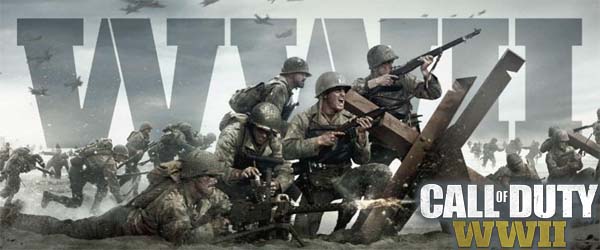
I haven't played a Call of Duty game since World At War on the PS3 almost 10 years ago. I really liked the first two CoD games on PC, but after Infinity Ward stopped developing the games, they increasingly focused on spectacle rather than any attempt to accurately portray war. After throwing back more enemy grenades in the first mission of World At War than were probably ever manufactured in all of World War II (I'm exaggerating a little bit), I got sick of that game and basically gave up on the franchise.
After having a little bit of fun with EA's Battlefield 1, I decided to pick up a used copy of Call of Duty World War II from eBay. I was curious if the return to World War II would be taken a little bit more seriously by Activision. It wasn't. This is the same old stale Call of Duty that I've been actively avoiding for the past decade. The single-player campaign didn't do anything to pull me in.
A light-gun shooting gallery
Probably the biggest problem with the campaign is just how rote and repetitive it feels. Almost all of the game's missions boil down to moving from one shooting gallery to another. When you aren't in an outright combat tunnel (like a bunker or trench), you're only given about a hundred feet of lateral space to work with. The whole game feels very confined and small in scale, with very few opportunities for any tactical movement such as flanking maneuvers. Just sit behind cover and pop out to take a few shots, then repeat. It might as well be an on-rails shooter, or one of those pop-out-and-shoot light-gun arcade machines like Time Crisis. I wonder if this was maybe done to make the game work better in VR? Maybe they wanted to reduce the amount of movement so that players don't get motion sick? But it's not VR, so it just comes off as lazy and tedious.
Almost all the missions boil down to moving from one narrow shooting gallery to another.
Even when the game tries to do something a little different, it usually still finds a way to make it uninteresting, or to outright get it wrong. There are some stealth mechanics shoe-horned into the game -- because of course there's stealth mechanics. They are rudimentary and very unforgiving. It's clear that certain segments are intended to be played stealthily, but you just don't have the tools necessary to make it work, and the levels aren't designed very well for stealth. Your limited field of view makes environmental and situational awareness very difficult. It's hard to tell where enemies are, and it's also hard to tell if your'e hidden behind cover. Even if you are effectively hidden, you can't peek out of cover to monitor the enemy's position or movements.
After stealth killing one or two enemies, I almost always got caught and was forced into more shoot-outs. Many of these scenarios involve the player being isolated and usually disarmed, so that you don't have the firepower to easily deal with a shootout when it inevitably happens. Put simply, the stealth is only barely functional and might as well not even have been included.
The undercover "Liberation" mission is the only level that is actually built around stealth.
The only stealth level that worked was the undercover "Liberation" mission with the Marquis (which you mostly play as a different character). ... [More]
66c29444-437c-4e77-8f5a-591d0762a918|0|.0
Tags:Call of Duty, Call of Duty: WWII, Activision, Sledgehammer Games, Raven Software, World War II, Germany, Nazi, history, war, Holocaust, Jew, concentration camp, online, multiplayer, Skinner Box, loot box, micro-transaction, gambling, shooter, bot, campaign, ESRB, eBay
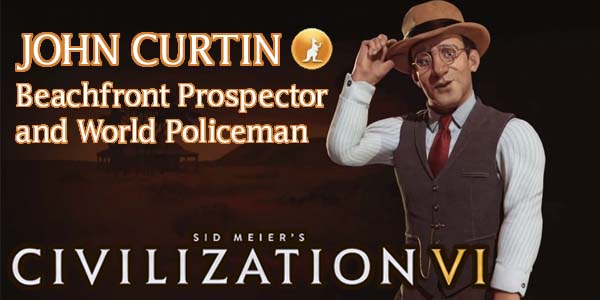
I've already written guides for some of Civilization VI's vanilla newcomer civs and leaders, so now I'm going to move onto one of the DLC civilizations that makes its first appearances in the franchise: John Curtin's Australia. This civ and leader are part of the "Deluxe Edition DLC". If you purchased the Deluxe Edition of the game, then you received this DLC (among others) for free when it was released. If you do not own the Deluxe Edition, then this DLC costs $5 USD.
Australia is currently the sixth largest country in the world (by land area) and is the only contemporary country that occupies an entire mainland continent. The continent was inhabited by the hunter-gatherer aboriginal Australians as long as 70,000 years ago, but very little is known about their history and culture. It is believed that they arrived on the continent via land bridges in Southeast Asia (probably connecting Indonesia and New Zealand to mainland Asia). The Dutch were the first Europeans to reach Australia in 1606, but it was the English that began colonizing the island-continent in 1788 to act as a penal colony in response to the recent American independence, which lead to a rapid decline in the native population. By the mid 1800's, Australia had ended the prisoner transport, and the colony began its transition into a full-blown nation.

John Curtin was the prime minister of Australia throughout most of World War II. He was appointed after the previous prime minister, Robert Menzies, was deposed by his own party. Curtin aligned Australia closely with the United States, which upset many British traditionalists, but proved instrumental in preventing the Japanese capture of the Philipines from turning into an invasion of mainland Australia. Curtin's leadership during the war, and his popular social service programs allowed him to coast to a mid-war re-election victory in 1943, but he did not complete that term due to rapidly-deteriorating health that lead to his death in 1944. He remains one of Australia's most beloved prime ministers.
DISCLAIMER:
Civilization VI is still very early in its life-cycle. Strategies for the game (and for specific leaders and civs) may change as Firaxis applies balance patches, introduces new features, or expands the game through DLC or expansion packs, or as the Civ community discovers new strategies. As such, the following strategy guide may change from time to time. I will try to keep it up-to-date, and will make notations whenever changes are made. I'll also post links in the official 2K forums and CivFanatics, where I'll also report any changes made. If possible and practical, I will try to retain the original content of the strategy for posterity.
I welcome any feedback or suggestions that readers wish to offer. Feel free to post on the linked forums, or by posting a comment at the bottom of the page.
This guide is up to date as of the Fall 2017 patch (ver. 1.0.0.194) (Southeast Asia DLC)
In Civilization VI, Australia is a civilization that favors expansion along coasts and wherever they have access to pasture animal resources. John Curtin is a defensive leader who can act as a sort of "sleeping giant" "world police", who can churn out a large military quickly if he is ever the target of a war or if he liberates another player (or city state) city. [More]
1df3bd1f-ebb3-4cbd-afbf-17cea4fbac4f|1|5.0
Tags:Sid Meier's Civilization, Civilization VI, Australia, John Curtin, land down under, citadel of civilization, perpetually on guard, digger, outback station, pasture, coast, appeal, culture bomb, war, liberate, defensive pact, city state, sleeping giant, unique improvement, unique melee unit
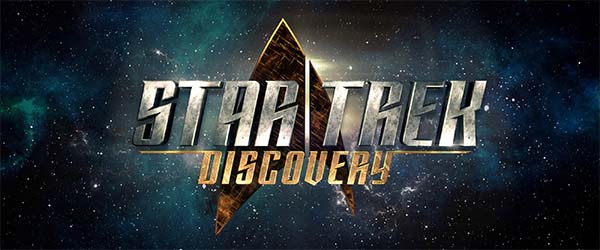
After a myriad of false starts, delays, production problem, bad PR, and generally negative expectations, Star Trek: Discovery finally premiered at the end of September. And the general consensus online seems to be pretty positive. It's not going to be the anthology series that I'd hoped for, but I didn't hate the first two episodes. I really didn't like them either, though.
Based on the season preview following the end of the second episode, it seems like it's kind of hard to gauge the series after just the first two episodes. They seem like more of a "prologue" to the main story, rather than part of the main story itself. These first two episodes take place on a different ship, with a different captain and crew, and a different situation than the rest of the show. So I don't know how representative they are going to be of the series itself.
The first two episodes see Captain Georgiou killed and the Shenzhou destroyed.
It seems a bit disingenuous (to me) for CBS to air only the first episode and then expect us to shell out $6 a month for the rest of the season. The first two episodes seem like they should have been the bare minimum, but three would have been even better, just so that audiences could see what the series proper is going to look like. Ideally, they should have aired the entire first season and then moved subsequent seasons to the streaming service. As it stands, I still don't trust the show enough to feel inclined to spend the money on a subscription. After all, it could be that the first few episodes were conceived under the direction of Bryan Fuller, and his spat with the studio, and subsequent departure from the project, could have lead to a radical change in direction for later episodes. But then again, those creative differences apparently cropped up before filming the premiere even started, so who knows how much of Fuller's creative vision even survived at all (despite the fact that he's credited as the creator and lead story writer in the opening credits).
Maybe I could pay for one month (or do a free trial) and then binge the entire rest of the series?
Anachronisms, and apparently space is no obstacle
Right off the bat, I had a lot of the knee-jerk reactions that I was expecting to have due to uniform anachronisms, costume and makeup redesigns, and so forth. CBS went to the trouble to recreate phasers and communicators that resemble the ones from the original Star Trek pilot, and apparently even made Klingon blood pink (ala Star Trek VI), but they couldn't be bothered to design ship-specific insignia badges for the uniforms? Everybody wears the delta-shield, which was supposed to be an emblem unique to the Enterprise. It was only adopted as the symbol of Starfleet (as a whole) later, in part because of the increased militarization of Starfleet due to the threat of the Klingons, and in honor of the Enterprise's service.
Just as I'd feared, everyone is wearing the same delta shield insignia.
And in the interests of fairness to the new Star Wars movies, I also can't neglect to mention the problem that the Discovery premiere had with distance... [More]
3f1397f1-d2ca-443b-95ee-d0cad5d4422f|0|.0
Tags:Star Trek, Star Trek: Discovery, science fiction, CBS, all access, streaming television, Bryan Fuller, Sonequa Martin-Green, Michael Burnham, Sarek, James Frain, Vulcan, human, Klingon, war, Shenzhou, Philippa Georgiou, Michelle Yeoh, T'Kuvma, Chris Obi
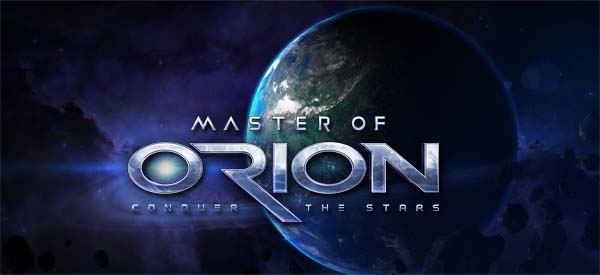
The 2016 reboot of Master of Orion kind of shoots itself in the foot a bit with its own subtitle: "Conquer the Stars". When I play 4x games, I like to feel like I'm really building an empire, managing an economy, and conducting diplomacy. All of those things are present in Master of Orion, but I've gotten a pretty distinct feeling that this is yet another strategy game that falls victim to military rushing being the optimal strategy by far. Master of Orion doesn't really want you to build a civilization and colonize the galaxy; it firmly wants you to do what its subtitle tells you: conquer the stars.
Master of Orion III was kind of shit (it was boring, ugly, and completely lacked personality and substance), but at least it made some effort to be new and interesting. Most noticeably, the galactic map was actually three-dimensional. Sure, this was a navigational and UI nightmare for the human player, but it required players to think differently about how they approached expansion and warfare. At a more fundamental level, MoO3 sought to be a game about macro-management, asking the player to manage a vast galactic empire rather than just a collection of a dozen or so planets. The meat of the game, thus, was intended to be in the mid-to-late stages, as developed empires engaged in epic battles for survival, rather than all the fun and challenge being front-loaded in the early rush to colonize all the nearby planets. It didn't work, but at least it was trying to genuinely innovate the 4x genre.
The new Master of Orion isn't anywhere near that ambitious, and seeks instead to simply bring the original Master of Orion concept (in its simplest form) into the age of high-resolution 3-d graphics. It's a scaled-down, bog-standard space-4x game that borrows heavily from Endless Space and Civilization V. But it is at least a competent one!
Conquer the Stars isn't as big, complex, or ambitious as Master of Orion 3, but at least it's competent.
The galaxy itself isn't very big this time around. Depending on the map's size, there's only a few dozen stars, and most of them only have two or three planets. Unstable star lanes and space monsters can lock you out of exploring certain systems until you research certain technologies or grow your military sufficiently large (respectively). Other than that, exploration is over fairly quickly (especially once you start performing map trades in diplomacy).
Planet-management is also fairly easy. You can assign population meeples between one of three different types of output: food, production, and research. Meeples of different jobs and races have different icons, and unhappy meeples on strike have icons that sit down holding a picket sign. It makes it very easy to see what your population's current status is at a glance. There's just not really much to do with them. You don't have to assign them to work specific buildings, and with only 3 outputs to manage, balancing or specializing isn't that difficult.
All the buildings in the game are also one-time builds that don't serve much function other than to provide flat points of one of the three outputs, or to modify the efficiency of meeples in a particular output category. Buildings that have unique functionality (such as the Spy Center, Gravity Generators, or Interplanetary Administration) are few and far between. The only other thing that you do with your planets is to occasionally terraform them in order to boost your max population and unlock additional slots along each of the output tracks.
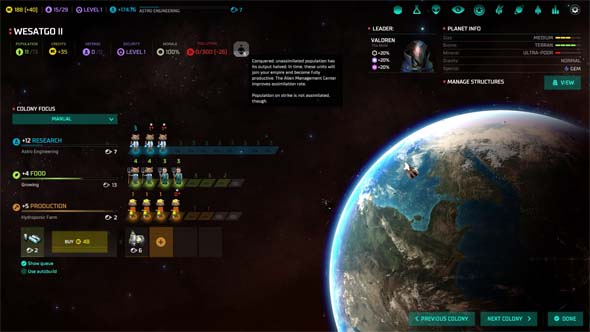
Each point of population is of a specific race, which affects the morale of conquered planets.
The tech tree also feels kind of bland and linear. I would much prefer a tech web along the lines of Civilization: Beyond Earth. Master of Orion kind of goes in this direction a bit by including some techs in which you have to chose which of two different items you want to take when you research certain techs. You can then trade for the other via diplomacy if you want to. It's kind of like the leaf nodes in Beyond Earth, but only some techs have them, and I rarely had to think too hard about which one I wanted... [More]
b529f082-d6e2-4759-8316-2633e3e77143|0|.0
Tags:Master of Orion, Master of Orion: Conquer the Stars, NGD Studios, Wargaming Labs, Steam, strategy, grand strategy, 4x, turn-based strategy, PC, science fiction, space, exploration, expansion, exploitation, extermination, colony, war, Michael Dorn, John de Lancie, Mark Hamill, Alan Tudyk, Nolan North, meeple, Master of Orion 3
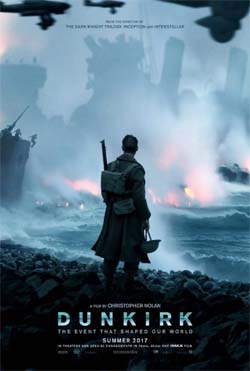
I've had a busy couple of weeks of movies! Three movies in the past two weekends, and planning on seeing Spider-Man: Homecoming in the next couple days. But first, while trying to keep ourselves entertained in Des Moines, my girlfriend and I decided to kill a couple hours at the movies and checked out the newly-released war movie from Christopher Nolan: Dunkirk.
I'll admit that it took me a little while to figure out this movie's chronological structure. Director Christopher Nolan decided to edit the movie into a non-sequential order, in which individual scenes jump back and forth between points in the movie's timeline (sometimes to show the same event again, but this time from a different point of view). There's three main storylines running in parallel: a pair of soldiers trying to catch a boat off the beach, a pair of pilots hunting down German bombers, and a civilian yacht captain setting sail to help rescue the stranded British army. Early in the movie, the scenes with the soldiers take place at night, and the scenes on the planes and in the yacht take place during the day.
At first, I thought maybe this was some kind of time zone difference. Like maybe the scenes on the boat were taking place sufficiently east that the sun had already set; whereas, the planes were flying far enough west that the sun hadn't set yet. This wasn't the case. The movie was, in fact, shifting between an aerial pursuit taking place during one afternoon and the boat escapes that happened the night before (or several nights before). Maybe I missed something at the beginning of the movie that made this all more clear?
I didn't have any trouble following along with the non-linear, compressed time in Inception, but this movie threw me off a tiny bit simply because I wasn't expecting it. Once I realized how the movie actually worked, it was easy to follow along with each of the individual threads, and to start to see where and how they intersected. Not a deal-breaker in any way. By the end, everything comes together quite nicely.
The early movie cycles between the day of the evacuation and conflict from the night before.
Much like War for the Planet of the Apes (which is quite good), Dunkirk is a surprisingly slow and quiet movie... [More]
ec6176f9-74f2-434d-999c-0026907a5531|0|.0
Tags:Dunkirk, Christopher Nolan, World War II, Britain, France, Germany, dogfighting, stuka, dive bomber, spitfire, U-boot, beach, English Chanel, silence, horror, war
|

| 12 | | | | | | | 60 | | 11 | | | | | | | 55 | | 10 | | | | | | | 50 | | 09 | | | | | | | 45 | | 08 | | | | | | | 40 | | 07 | | | | | | | 35 | | 06 | | | | | | | 30 | | 05 | | | | | | | 25 | | 04 | | | | | | | 20 | | 03 | | | | | | | 15 | | 02 | | | | | | | 10 | | 01 | | | | | | | 05 |
|